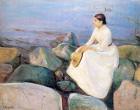A mark
 There is an old man with an AOL account address on my list of authors for next season. I correspond with him about catalog copy and an author bio to pass along to the sales reps, though I know his isn't a book the chains will carry: the chains don't carry anything anymore. He writes to me in shorthand: phrases, usually. Often all-cap. He either doesn't sign at all, or signs JIM. He happens to be a retired admiral with a jaw-dropping past. I maintain formality, though I'm not a formal person; there's a whole species of life here that I don't understand and can't relax around.
There is an old man with an AOL account address on my list of authors for next season. I correspond with him about catalog copy and an author bio to pass along to the sales reps, though I know his isn't a book the chains will carry: the chains don't carry anything anymore. He writes to me in shorthand: phrases, usually. Often all-cap. He either doesn't sign at all, or signs JIM. He happens to be a retired admiral with a jaw-dropping past. I maintain formality, though I'm not a formal person; there's a whole species of life here that I don't understand and can't relax around.There's something about old people who have led extraordinary lives but have not become egomaniacs. Even when they get smaller and balder and paunchier--even when they wear grandpa clothes and smile at strangers and lose their hearing. You can tell: they're bigger than the rest of us.
My kids were asking me about the Bataan Death March at the dinner table last night; dinner conversations have changed since I took this job: work is like one big field trip. Should the POWs who were used as slave labor by Japanese companies be compensated after the fact, or shouldn't they? They were prisoners, after all. Who's the good guy in a war scene? It's not easy to say.
I know one of these soldiers. He's not a retired admiral: he's just a regular guy--just an average, everyday former POW. He's got that quality that the admiral has: a gentleness, a softness. Buddha-like softness. It's hard to imagine him killing anyone, or being beaten, or starved. How is that, when we think brutality makes people hard?
***
I'm 43 now. I keep waiting to feel that life is passing too quickly, or that I haven't had time to do what I want to do--or to discover something I never even knew I wanted to do. I haven't, that is, commanded the Atlantic fleet, or won the big tobacco case, or written the book. I've got some time still. But I think I may be lucky that way: I think the kids are what I wanted to do, and for all that I think I'd change if I could, I wouldn't have written it any other way.

5 Comments:
Your children are a legacy that will live beyond many many others; one made especially wonderful because they're being raised by YOU!
Wish I were young enough to be adopted...
alan
i love you.
Sometimes I regret not having achieved more in my sinful life, but having loved my children not unwisely often seems sufficient. Would you give them up to be a Brontê sister or Dorothy Parker? I thought not.
And I am reminded of the Zen story: One monk was boasting about his master's ability to stand on one side of a river and materialize on the other. The Zen monk replied, "My miracle is precisely this: When I am hungry I eat. When I am thirsty I drink."
Here's a different version of the story:
While Bankei was preaching quietly to his followers, his talk was interrupted by a Shinsu priest who believed in miracles, and thought salvation came from repeating holy words. Bankei was unable to go on with his talk, and asked the priest what he wanted to say. 'The founder of my religion," boasted the priest, "stood on one shore of a river with a writing brush in his hand. His disciple stood on the other shore holding a sheet of paper. And the founder wrote the holy name of Amida onto the paper across the river through air! Can you do anything so miraculous?"
"No," said Bankei, "I can do only little miracles. Like: when I am hungry, I eat. When I am thirsty, I drink. When I am insulted, I forgive."
Good heavens....and I thought I was the only one with dinner conversations in my house like that.
They are amazing aren't they?
How'd we get so lucky, Inger? :)
And so much of their lives and ours are still pages to be written...
Post a Comment
<< Home